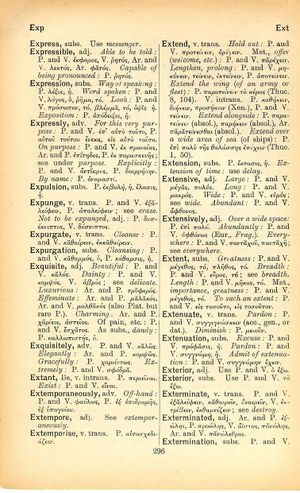exterior: Difference between revisions
From LSJ
πρὸ τελευτῆς μὴ μακάριζε μηδένα, καὶ ἐν τέκνοις αὐτοῦ γνωσθήσεται ἀνήρ → Count no man blessed before his end; a man will be recognized in his offspring. (Ecclesiasticus 11:28)
m (Text replacement - "(|thumb)\n(\|link=)" to "$1$2") |
m (Woodhouse1 replacement) |
||
| Line 1: | Line 1: | ||
{{Woodhouse1 | {{Woodhouse1 | ||
|Text=[[File:woodhouse_296.jpg|thumb|link={{filepath:woodhouse_296.jpg}}]] | |Text=[[File:woodhouse_296.jpg|thumb|link={{filepath:woodhouse_296.jpg}}]] | ||
Use P. and V. ὁ [[ἔξω]]. | ===adjective=== | ||
Use [[prose|P.]] and [[verse|V.]] ὁ [[ἔξω]]. | |||
Use P. and V. | ===substantive=== | ||
Use [[prose|P.]] and [[verse|V.]] [[τὸ ἔξω]]. | |||
}} | }} | ||
{{Lewis | {{Lewis | ||
Revision as of 09:19, 20 May 2020
English > Greek (Woodhouse)
adjective
substantive
Latin > English (Lewis & Short)
extĕrĭor: us, v. exter, II.
Latin > French (Gaffiot 2016)
extĕrĭor, ĭus, gén. ōris, compar. de exter, plus en dehors, [ou en parl. de deux] le plus extérieur : Cic. Tim. 25 ; Cæs. G. 7, 74 ; 7, 87, 4 ; C. 3, 63, 6 ; comes Hor. S. 2, 5, 17, compagnon qui laisse à l’autre le haut du pavé.
Latin > German (Georges)
exterior, s. exter.

